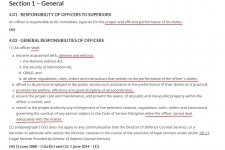What is the CAF policy defining leadership failure?
Not answering the exact question but...sorry it took me so long, I couldn't remember the exact Chap's and passages. Obviously, some cherry-picked ones from the total of 164 pages...
Leadership in the Canadian Forces CONCEPTUAL FOUNDATIONS
To motivate and guide behaviour, values cannot be only
words on paper. To be credible, they must be a living part of
CF culture. This means that
CF leaders must exemplify commitment
to institutional values, must embed them in policies
and practices, and must reinforce them through their
actions. In short, leader integrity is critical in establishing
and maintaining a values-based culture and organizational
climate. Integrity, what some military scholars and ethicists
call the master value, ensures that what we strive to achieve
on behalf of the CF we do in ways that are worthy of military
professionals.
It has been said that in order to transform a civilian into
a disciplined soldier, the soldier must “upon entering the
service, come to live in his relation to command, and to
respect it much as he does the force of gravity, or the march
of time.”31 The training régime within the CF is one of the
positive means designed to instill the habit of obedience.
As well,
the personal example of the leader, including his or
her integrity, skill, and knowledge, is another important
factor.
In very general terms, leaders in the CF – both formally
appointed leaders and emergent leaders – are responsible
for: accomplishing the mission, structuring and integrating
teams and units for optimum efficiency and co-ordination,
ensuring member well-being and commitment, establishing
and maintaining capabilities to adapt to change, and regulating
conduct in accordance with the value systems of the
Canadian military ethos. Many of these responsibilities are
reinforced in the statements of duties found in regulations
and in the role expectations symbolically communicated
through warrants and commissioning scrolls.




